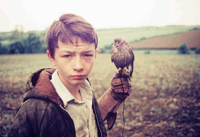In the poor, working class coal mining town of Barnsley, an adolescent boy named Billy (David Bradley) sharing a cramped bed with his older brother Jud (Freddie Fletcher) is jarred awake by the sound of his Jud’s alarm clock. Prodding his soporific brother to rise, he seizes the opportunity to comfortably stretch out on the narrow bed for his last few minutes of sleep as Jud dresses to go to work. A mediocre and ambitionless student, Billy seems destined to follow in the footsteps of his older brother and work in the drudgery of the pit, an empty and dead-end prospect that he adamantly and vociferously rejects, even as he is unable to articulate his own plans for the future beyond his desire to leave school. His part-time job delivering newspapers before the start of the school morning assembly for a local store equally proves equally uncertain, having been caught stealing in the past by the shopkeeper, and habitually arriving late to work after Jud invariably steals his bicycle to ride to the mines after a late start. Neglected and often abandoned at home by his selfish and convivial mother (Lynne Perrie) as she entertains her latest paramour at a local pub, the aimless and trouble-prone Billy nevertheless stumbles into a constructive avocation when one day, he spots a kestrel’s nest near the woods. Intrigued by a conversation with a receptive neighbor on the challenge and skill of falconry, he steals a young kestrel from the nest and embarks on a focused and disciplined regimen to train the graceful wild bird.
Based on the Barry Hines novel A Kestrel for a Knave, Kes is a direct, unsentimental, and provocative portrait of poverty, marginalization, apathy, and despair. Ken Loach’s unobtrusive cinema vérité-styled filmmaking and non-professional casting create a documentary fiction that integrates organic and unflinching realism within the narrative framework of a drama. Loach’s presentation of the dispiriting, stringently imposed regimentation of institutional public education that is carried over in the rampant neglect and abusive relationships within Billy’s family reflects the psychologically (and emotionally) ingrained cycle and entrenchment of violence and cruelty that metastasizes from personal failure, social impotence, and pervasive hopelessness: Jud’s self-affirming declaration of contentment with his life despite his repeated (and deliberate) inebriation and carousing after work; the mother’s expressed concern for the welfare of her children that, hypocritically, takes place in the pub after she leaves Billy alone for the evening; the failed athlete-turned-physical education teacher, Mr. Sugden (Brian Glover) who concocts World Cup scenarios during football games and punishes students who do not enable his immature fantasy; the stern headmaster Mr. Gryce (Bob Bowes) whose arbitrarily enforced disciplinary actions serve more as a means to re-assert authority than to uncover truth and root out culpability. Contrasting the desolation and spiritual poverty of Billy’s oppressively confining environment against his liberating, almost meditative ritual of kestrel training in the open field, Loach creates a sublimely transitory, yet indelible image of natural communion, existential purpose, and transcendence.
© Acquarello 2003. All rights reserved.
